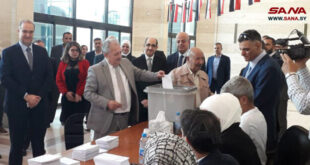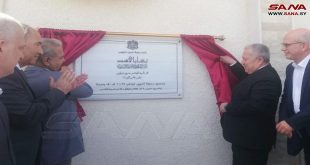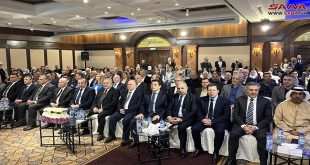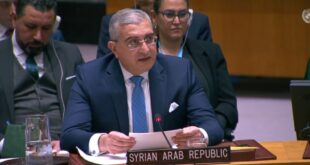Damascus, SANA – The Higher Council for Economic and Social Planning held a meeting chaired by Prime Minister Imad Khamis, during which the plans and budgets of ministries and state establishment within the 2018 general state budget were discussed.
Premier Khamis said that the 2018 budget will follow the principle of “work based on changes,” which means that the government’s work must serve the priorities of production, reconstruction, and steadfastness of the state.
He went on the say that the main priority in the 2018 budget will be relaunching stalled production projects, followed by securing what is needed to ensure the steadfastness of the state and the army.
Chairman of Planning and International Cooperation Authority Imad Sabouni reviewed the implementation of the 2017 investment spending, noting that the water and electricity sectors are at the top in terms of implementation and spending, noting that the low implementation rates are caused by the estimated costs of projects, the economic measures against Syria, and insufficiency of income.
In turn, Finance Minister Maamoun Hamdan reviewed the estimates for the 2018 state budget, which will see an increase compared to 2017, including an 8% (SYP 35.45 billion) increase in the sum of wages for employees.
The Council discussed the investment plan of the Electricity Ministry, which focuses on providing electricity for citizens, agriculture, and industry, with emphasis on both traditional energy projects and renewable energy, while the Petroleum and Mineral Resources Ministry’s plan outlined its needs for finishing projects, rehabilitating facilities and wells, and procuring petroleum products.
The Agriculture Ministry’s plan focused on supporting production, particularly for cattle and poultry, in addition to supporting scientific research, raising Awas sheep, and launching projects for bees and silkworms and relaunching the modern irrigation project and raising the efficiency of water resources use.
Meanwhile, the Transport Ministry’s investment plan involves an increase in the rehabilitation of roads, in addition to expanding aviation and maritime transportation projects, while the Industry Ministry’s plan involves developing a number of factories for manufacturing iron, serums, glass, preserved food, yeast, and a basalt smelting plant, and the Education Ministry’s plan focused on repairing schools in areas liberated from terrorism and providing all their needs.
The Council also discussed the plans of the Interior Trade and Consumer Protection, Water Resources, Communications and Technology, and Interior Ministries, and it will discuss the plans of the rest of the ministries on Sunday.
In a statement to journalists after the meeting, Education Minister Hazwan al-Waz said the Ministry’s budget for 2018 has increased from SYP 28.3 billion to 30.9 billion, marking a 15% increase, which can be raised further in light of the pressing need to repair schools in Deir Ezzor province which was provided with half a million school textbooks, adding that 1,371 schools have repaired, 491 of them in liberated areas, with 84 schools operating in the eastern neighborhoods of Aleppo city.
For his part, Agriculture Minister Ahmad al-Qderi said that the Ministry’s budget was SYP 14.8 billion, but during the meeting the plan was given an extra 3 billion to raise the total to 17.7 billion, while Petroleum Minister Ali Ghanem said that SYP 24.2 billion were allocated for the Ministry’s budget, which will contribute to drilling and exploration operations, repairing infrastructure and refining facilities, and operating new wells, among other projects.
In turn, Transport Minister Ali Hammoud said that the Ministry’s budget is set at SYP 31.7 billion, and its plan will involve rehabilitating airports and the aviation fleets, as well as expanding work in all sectors of the marine fleet.
In a similar statement, Electricity Minister Mohammad Zuhair Kharboutli said that there are studies for renewable energies that will be implemented in 2018 if their funding is procured, adding that a contract was signed with Iran to install 5 gas-powered plants at an estimated cost of SYP 60 billion provided by the Iranian side, while the Syrian government provided SYP 12 billion to bring the first plant.
Water Resources Minister Nabil al-Hassan said that the 2018 budget for his ministry is SYP 41 billion, marking an increase of 13 billion compared to 2017, and that the projects in the 2018 plans will focus on providing drinking water to all areas, especially those that suffer water shortages.
Hazem Sabbagh
 Syrian Arab News Agency S A N A
Syrian Arab News Agency S A N A




